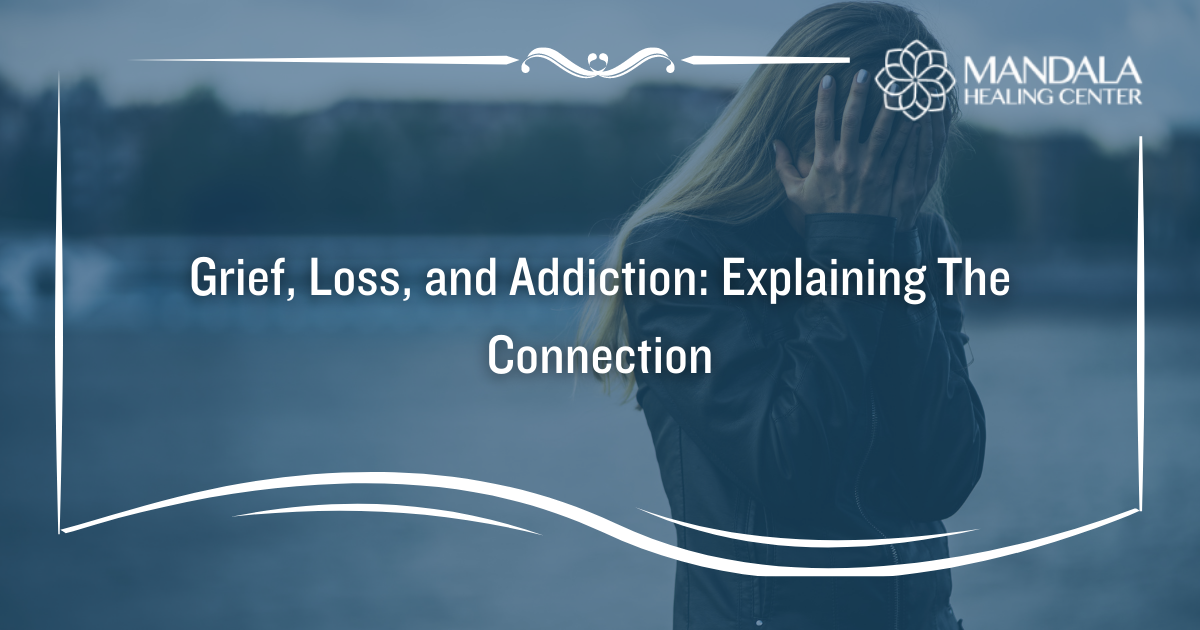Trauma causes an insurmountable amount of stress and psychological damage. Unfortunately, many individuals are not equipped with the proper coping mechanisms to recover from trauma on their own. Because of this, the effects of their trauma begin to take their toll. This is what leads an individual to begin abusing substances after experiencing a traumatic event.
Losing a loved one and dealing with the grief caused by death is a form of trauma. Many people describe the loss of a friend or family member as the key event that led them to develop an addiction. This is why there is such a close relationship between grief, loss, and addiction.
What is Grief?
Grief is an emotion that follows a traumatic loss, often stemming from the death of a loved one. However, grief may be caused by any form of loss, including the loss of a job, lifestyle, or relationship. Oftentimes, unresolved grief leads to additional psychological conditions like depression.
The common signs and symptoms of grief include:[1]
- Prolonged periods of sadness
- Experiencing feelings of shock, disbelief, or denial
- Anger
- Anxiety and distress
- Loss of sleep
- Loss of appetite
- Isolating from friends and family
- Depression
- Abusing drugs and alcohol
When grief is left untreated, it can begin to take over an individual’s life. Constantly feeling the weight of overwhelming sadness, shock, and anger would become too much for anyone. When an individual is going through the grief process without professional help, they may begin to look for ways to cope. This often leads the individual to develop unhealthy coping mechanisms that only mask their symptoms of grief, rather than treating them.
How Grief and Loss Influence Substance Abuse
Grief causes an array of uncomfortable and difficult-to-deal-with emotions. When an individual does not have access to professional counseling for grief, those emotions will begin to pile up. They may begin to think that their feelings are permanent, leading them to give up on recovering naturally. This leads them to look for outside sources of relief, including overspending, eating in excess, having a lot of meaningless sex, and even drug or alcohol addiction.[2]
When an individual begins to abuse substances as a grief response, they are hoping that their emotions will be numbed or dulled. While drugs and alcohol can provide a temporary numbing effect on one’s emotions, the symptoms of their grief will only worsen over time. Unfortunately, this causes them to continually increase the number of substances that they consume. As a result, they end up becoming addicted to drugs or alcohol.
Dual Diagnosis Treatment for Grief, Loss, and Addiction
When someone struggles with unresolved grief and addiction, they need to attend a professional treatment center. Because they are dealing with trauma and a substance use disorder, they are considered to be a “dual diagnosis” patient. What this means is they have co-occurring problems that must be addressed simultaneously for them to experience positive results.
A dual diagnosis rehab center can provide adequate support for grief, loss, and addiction.
Medication-Assisted Detox
The first step of dual diagnosis addiction treatment is completing a medication-assisted detox. A medication-assisted detox is a form of detoxification that involves the use of FDA-approved medications. These medications work to lessen the symptoms of withdrawal and stop the individual from experiencing drug cravings.
Medication-assisted detox is vital to recovery from grief and substance abuse. This is because an individual cannot begin healing from their grief until they overcome the physical effects of their addiction.
Individual Therapy
Dual diagnosis treatment for grief and addiction emphasizes individual therapy. Because the patient’s addiction was caused by an inability to process their grief, undergoing therapy for trauma and loss is vital to their sobriety.
Individuals attending professional treatment for grief may utilize the following types of therapies:[3]
- Cognitive Behavioral Therapy (CBT)
- Acceptance and Commitment Therapy (ACT)
- Traumatic Grief Therapy
- Complicated Grief Therapy
- Holistic Therapies
Group Counseling
Group counseling is a vital aspect of recovery from both grief and addiction. When an individual can sit with a group of peers who are going through similar tragedies, they gain helpful coping tools, new insight, and a sense of support. Group counseling provides individuals with a safe space to discuss their grief and addiction in a confidential, loving, and supportive environment.
Medication Management
Individuals who struggle with grief and addiction often deal with depression, anxiety, and even insomnia. Because of this, they may benefit from the use of non-addictive psychiatric medications. For example, if an individual is suffering from depression or anxiety, they may be prescribed SSRIs or SNRIs to rebalance the chemicals in their brain that have been affected.
Find Treatment for Grief, Loss, and Addiction Today
If you or a loved one have experienced a traumatic loss that led to the development of an addiction, you are not alone. At Mandala Healing Center, we pride ourselves on creating a supportive and caring treatment environment for every one of our patients.
From medication-assisted detox to evidence-based behavioral therapies, our program has everything you need to recover from grief and addiction. Contact us today for more information on how to get started.
References:
- https://www.cdc.gov/mentalhealth/stress-coping/grief-loss/index.html
- https://pubmed.ncbi.nlm.nih.gov/31229191/
- https://www.ncbi.nlm.nih.gov/pmc/articles/PMC2146191/












